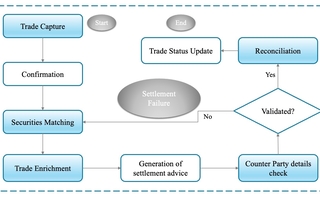Tech spend, AI fuel JP Morgan’s fight against Big Tech giants
JP Morgan Chase, which has spent more than $15 billion this year on technology, intends to invest even more to compete against tech behemoths.

JP Morgan’s status as the largest tech spender in banking was “sort of mandatory,” said CFO Jeremy Barnum, who spoke during the bank’s Q3 earnings call on Friday.
“We’re a big and very technology-centered business, and the world is competitive, and everything’s changing,” Barnum said. “Younger generations have different expectations, and we have to be nimble and be on the front foot—otherwise we risk getting severely disrupted.”
Earlier this year, JP Morgan began experimenting with using quantum computing for deep hedging. The bank’s technology team comprises more than 50,000 employees, and has been working on financial services applications using emerging technologies technology for years, investing more than $12 billion annually in them on average. This time last year, WatersTechnology reported that JP Morgan had joined forces with Goldman Sachs to explore ways of accessing market data in the cloud.
At JP Morgan’s investor day in May of this year, chief information officer Lori Beer said the bank’s tech spend at the end of 2023 is expected to be $1 billion higher than at the same point in 2022, ticking up from $14.3 billion to $15.3 billion.
CEO Jamie Dimon said on the earnings call that JP Morgan’s high tech spend was a necessity, in part, due to business competition coming from Big Tech firms that are rapidly becoming major fintech providers.
“The competition when we look at it, is Wells [Fargo] … it’s Marcus [by Goldman Sachs], it’s Apple, it’s Chime, it’s Dave. … It’s Stripe in payments,” Dimon said. “We want to be very good and very competitive.”
Dimon said some of JP Morgan’s tech spend was on vital services—instead of innovative ones—such as cybersecurity, datacenter resiliency, and meeting regulatory requirements.
Along with other financial institutions, JP Morgan has also been investing a lot of resources into artificial intelligence. In a letter to shareholders from April of last year, Dimon said the bank had more than 300 AI-related use cases currently in production across risk, prospecting, marketing experience and fraud prevention. In the same letter, he also stated that JP Morgan had been ranked first on the Evident AI Index, a public benchmark that rates major banks on their AI maturity.
“AI is an extraordinarily good tool to use. The management teams are getting better and better at saying, ‘How can we use the data to do a better job to reduce hours and serve clients better?’” Dimon said on the earnings call.
As JP Morgan plans to continue its high tech spend in 2024, Dimon maintains that the disruption risk AI presents is worth it. “Does it create an opportunity for disruptors to come in? Yeah, of course, that’s always been true with technology, and we’ll be quite good at it,” he said.
Only users who have a paid subscription or are part of a corporate subscription are able to print or copy content.
To access these options, along with all other subscription benefits, please contact info@waterstechnology.com or view our subscription options here: http://subscriptions.waterstechnology.com/subscribe
You are currently unable to print this content. Please contact info@waterstechnology.com to find out more.
You are currently unable to copy this content. Please contact info@waterstechnology.com to find out more.
Copyright Infopro Digital Limited. All rights reserved.
You may share this content using our article tools. Printing this content is for the sole use of the Authorised User (named subscriber), as outlined in our terms and conditions - https://www.infopro-insight.com/terms-conditions/insight-subscriptions/
If you would like to purchase additional rights please email info@waterstechnology.com
Copyright Infopro Digital Limited. All rights reserved.
You may share this content using our article tools. Copying this content is for the sole use of the Authorised User (named subscriber), as outlined in our terms and conditions - https://www.infopro-insight.com/terms-conditions/insight-subscriptions/
If you would like to purchase additional rights please email info@waterstechnology.com
More on Emerging Technologies
Quants look to language models to predict market impact
Oxford-Man Institute says LLM-type engine that ‘reads’ order-book messages could help improve execution
The IMD Wrap: Talkin’ ’bout my generation
As a Gen-Xer, Max tells GenAI to get off his lawn—after it's mowed it, watered it and trimmed the shrubs so he can sit back and enjoy it.
This Week: Delta Capita/SSimple, BNY Mellon, DTCC, Broadridge, and more
A summary of the latest financial technology news.
Waters Wavelength Podcast: The issue with corporate actions
Yogita Mehta from SIX joins to discuss the biggest challenges firms face when dealing with corporate actions.
JP Morgan pulls plug on deep learning model for FX algos
The bank has turned to less complex models that are easier to explain to clients.
LSEG-Microsoft products on track for 2024 release
The exchange’s to-do list includes embedding its data, analytics, and workflows in the Microsoft Teams and productivity suite.
Data catalog competition heats up as spending cools
Data catalogs represent a big step toward a shopping experience in the style of Amazon.com or iTunes for market data management and procurement. Here, we take a look at the key players in this space, old and new.
Harnessing generative AI to address security settlement challenges
A new paper from IBM researchers explores settlement challenges and looks at how generative AI can, among other things, identify the underlying cause of an issue and rectify the errors.








